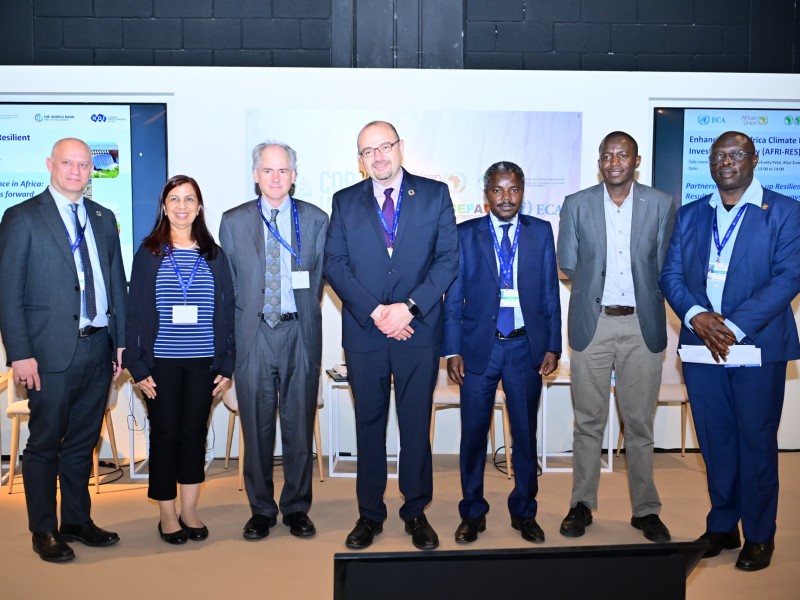Dubai, United Arab Emirates, 6 December 2023 (ECA) - To ensure long term climate resilience and investments in climate sensitive sectors, including water, infrastructure, energy and agriculture, Africa needs to scale up and increase its partnerships in the Africa Climate Resilient Investment Facility (AFRI-RES), according to experts at a side event on the margins of COP28 in Dubai.
AFRI-RES was established to support African countries and stakeholders with the tools and capacity to integrate climate resilience in investments in critical sectors.
The side event on partnership for scaling up resilience in Africa: Results, lessons learned and ways forward was organised by United Nations Economic Commission for Africa (ECA), African Union Commission (AUC), African Development Bank (AfDB), World Bank Group, Nordic Development Fund (NDF).
Nassim Oulmane, Acting Director Technology, Climate Change and Natural at ECA said African economies are losing on average 5% of their GDP per year because of the adverse impacts of climate change
For example he said the cyclone Freddy in Malawi early this year affected 4.8% of the country’s GDP. It affected the main dam that generates electricity and they are still struggling to fil the gap of 40%.
“This is a huge loss for a developing country. It is therefore important to strengthen the capacity of African institutions and private sector to plan, design, and implement investments in selected sectors to increase their resilience to climate change,” said Mr Oulmane.
He said the first phase of AFRI-RES has ended and the second phase will rely on the lessons learnt in the first phase.
“Phase one generated knowledge that has informed the climate resilience sector guidance notes and knowledge products,” said Mr Oulmane.
Kanta Rigaud, Lead Environmental Specialist at the World Bank, in her presentation on enhancing the African climate resilient investment facility partnership for scaling up resilience in Africa said 30 AFRI-RES projects that include traditional projects (agriculture, water) and nontraditional projects (energy, health, finance competitiveness and innovation) received funding over the last five years to deepen climate resilience in investments.
Citing the case of West Africa (Ghana, Cote d’Ivoire, Cameroon, Burkina Faso), she said the heat stress in human labor and poverty revealed the impact of climate change on agriculture, jobs and poverty and informed the diagnostics of the World Bank Country Climate Development reports.
“To address the heat stress in human labor and poverty, there is need to deploy resilience attributes to into design and monitoring of projects; translate knowledge into practical skills and capacity with a focus on modular units and certification programs; ensure training materials for integration of climate resilience in PIDA phase 2 developed and validated.
During the AFRI-RES phase 1, ECA developed a Climate change knowledge and data portal as a gateway to other similar portals.
Rigaud said, based on the findings of the phase one of AFRI-RES, and looking ahead, it is important to ensure a growing demand for AFRI-RES knowledge and training products including pace and reach. There is also an urgent need for a one stop for climate data and information.
Haruna Gujba from the African Union Commission (AUC) said building partnerships and sustained networks is key for the next stage of AFRI – RES and it requires a three part strategy that includes the next generation of knowledge products that can reach deeper and wider; training and capacity building for sustained impact and broadening partnerships.
Issued by:
Communications Section
Economic Commission for Africa
PO Box 3001
Addis Ababa
Ethiopia
Tel: +251 11 551 5826
E-mail: eca-info@un.org
